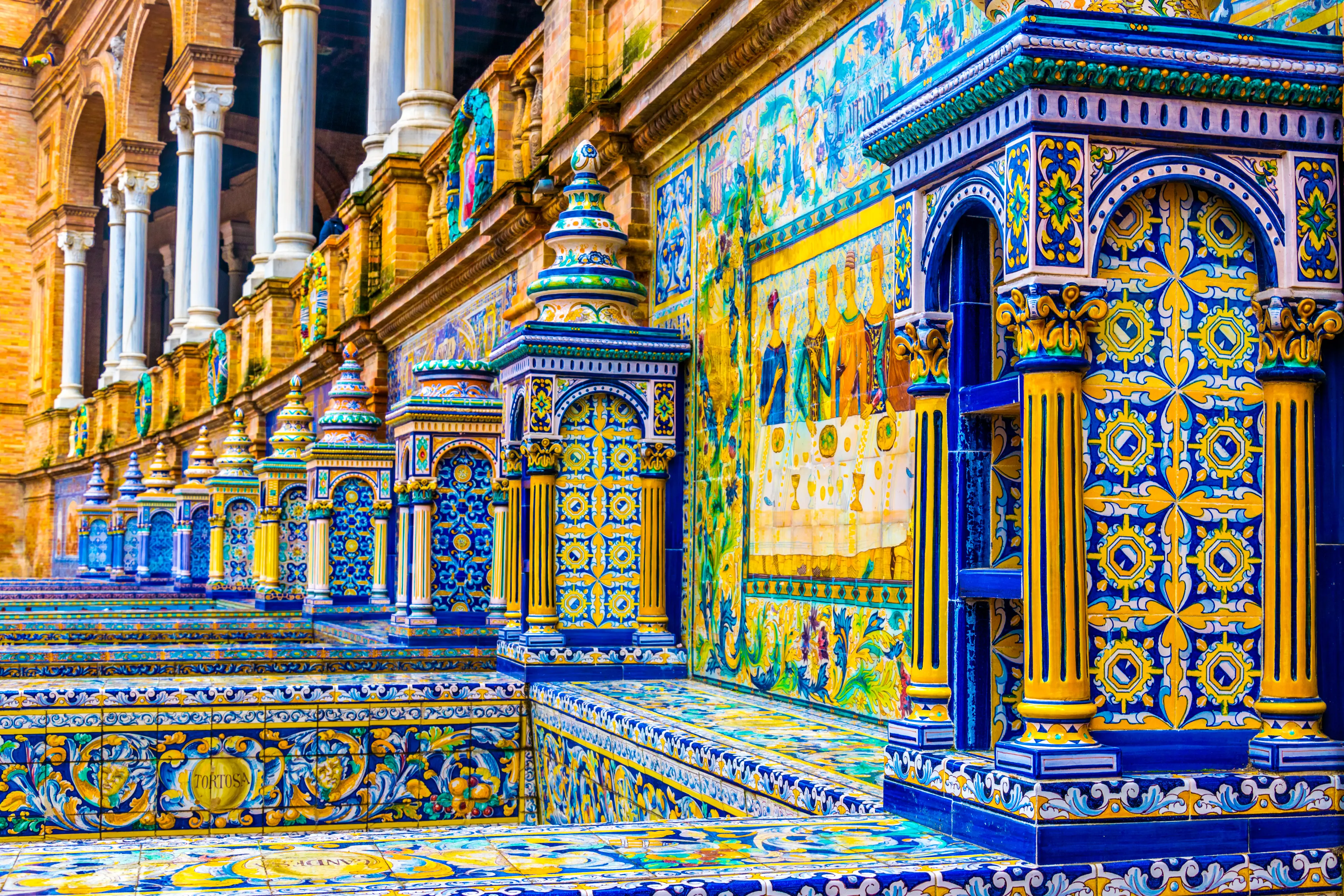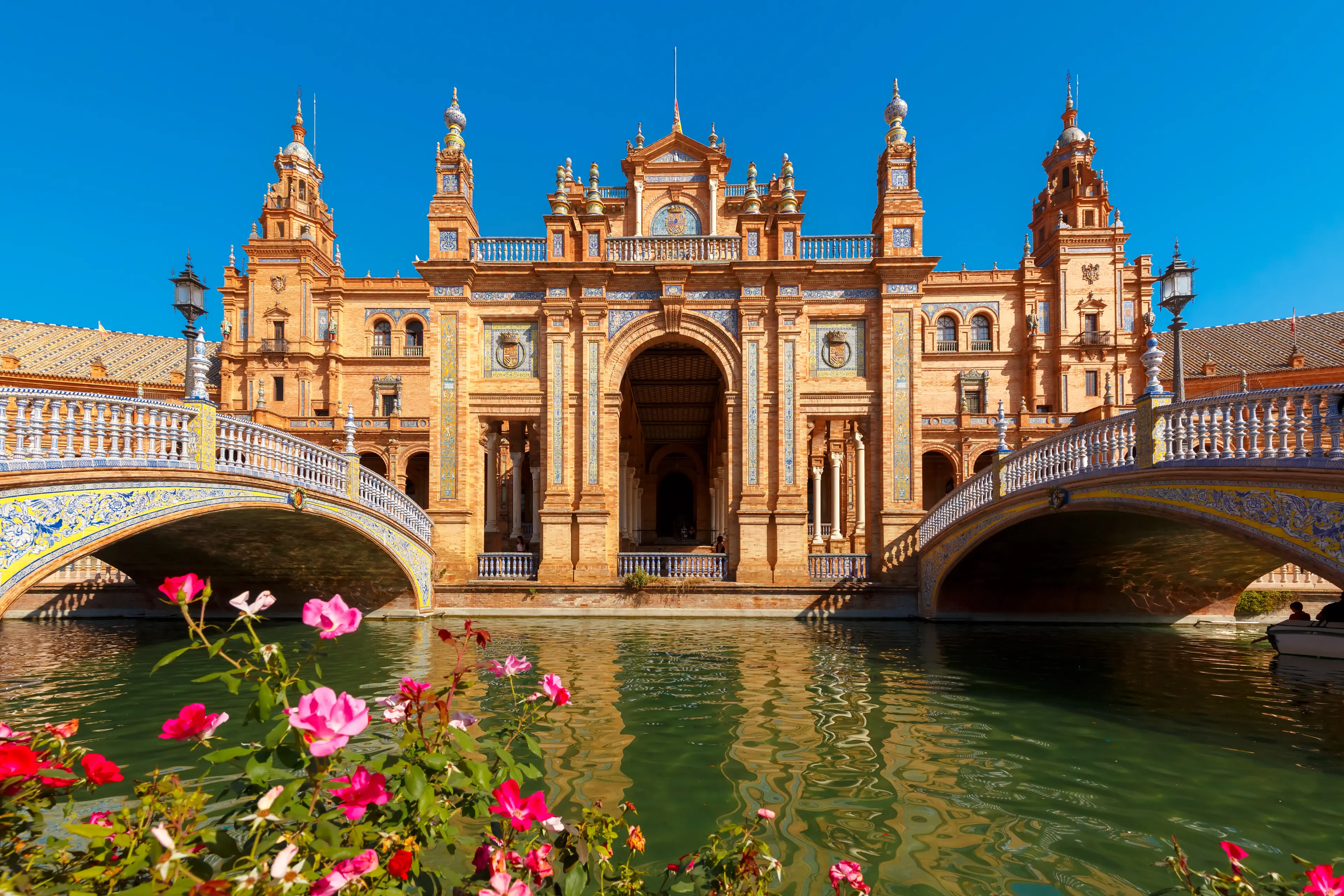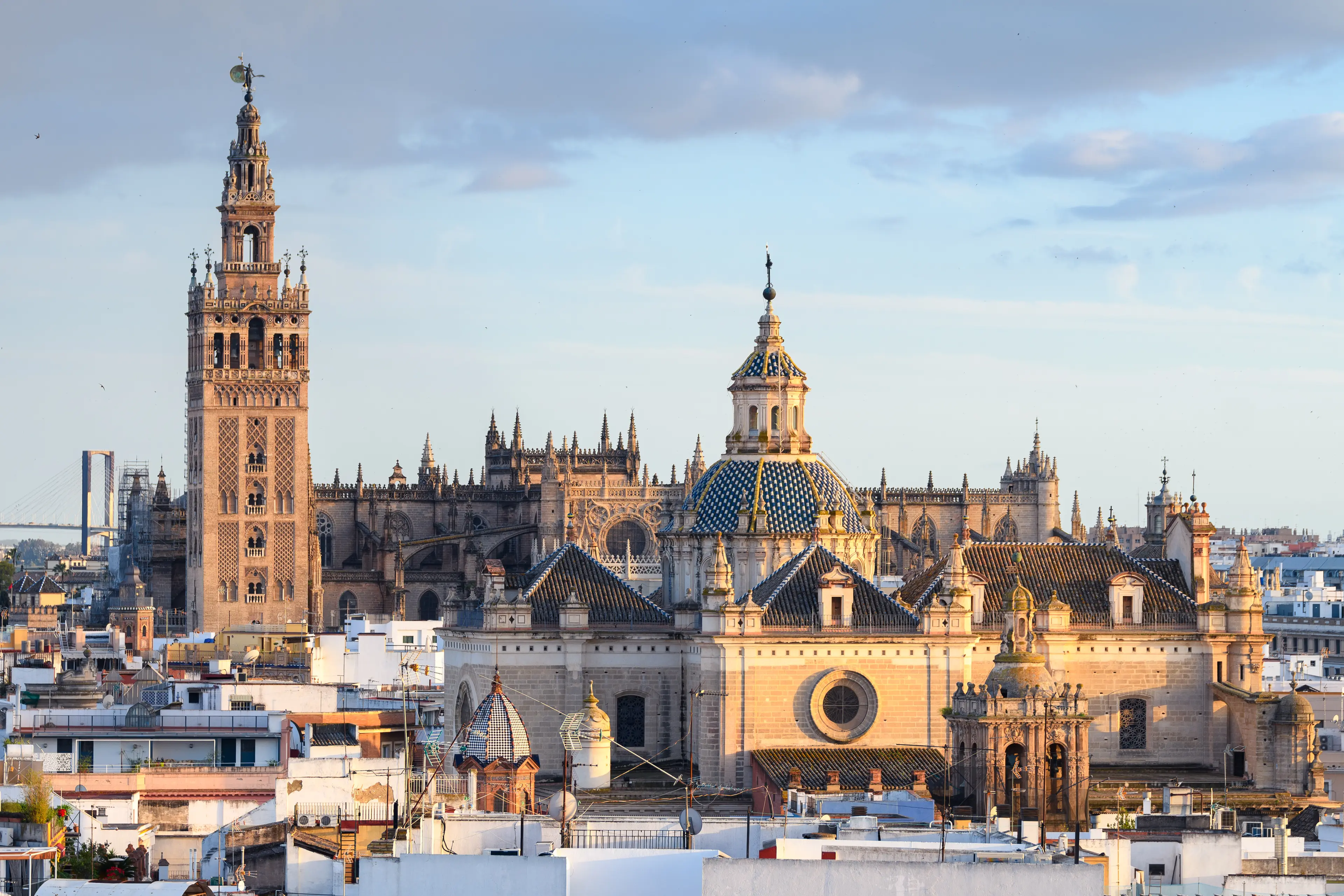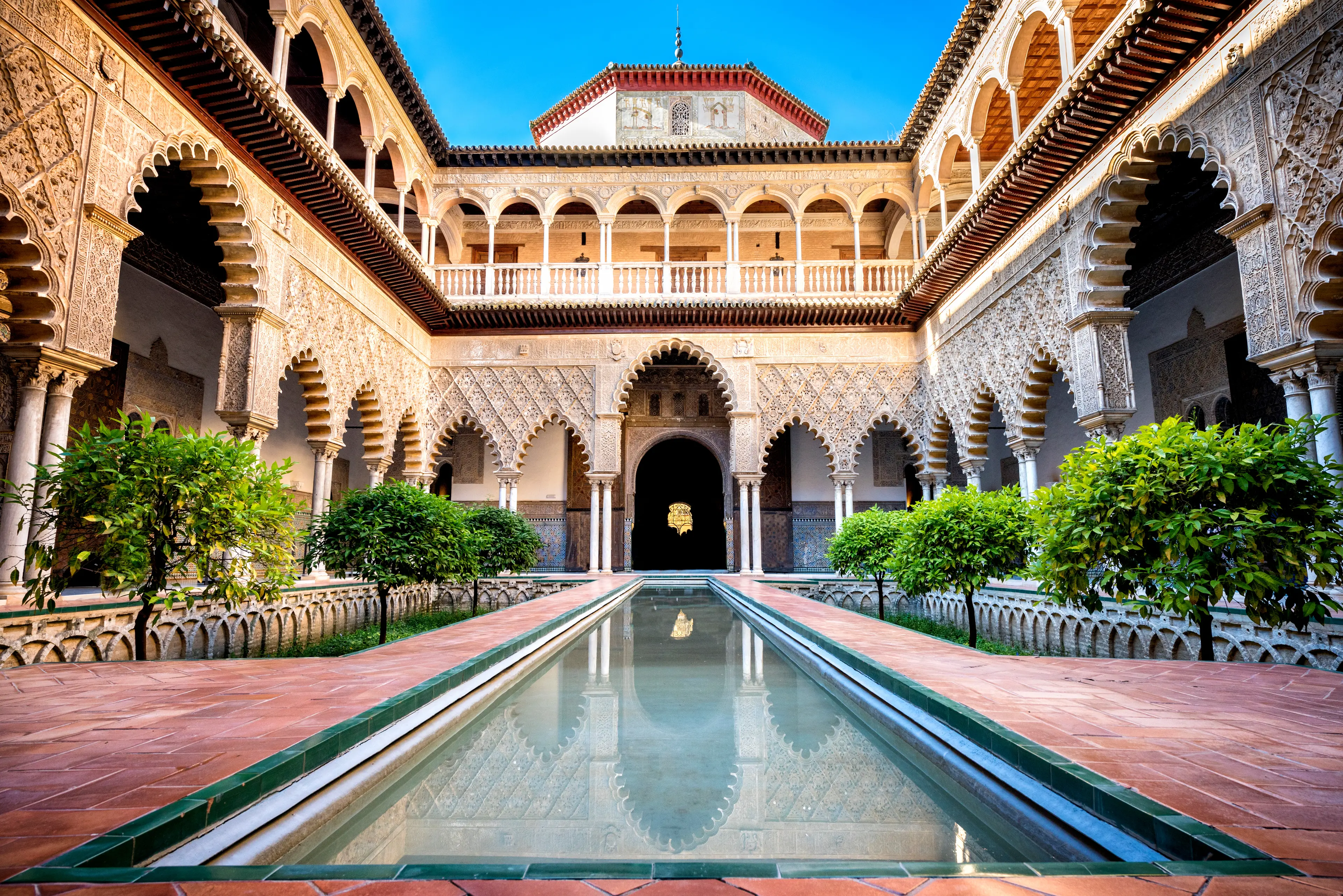2-Day Local Family Adventure: Seville Sightseeing, Outdoors & Shopping
Seville, Spain
2 days





About Seville, Spain
Discover the enchanting city of Seville, Spain, a vibrant fusion of rich history, stunning architecture, and lively flamenco culture. Marvel at the city's iconic landmarks like the majestic Seville Cathedral, the largest Gothic cathedral in the world, and the Alcazar, a stunning Moorish palace. Wander through the charming Santa Cruz neighborhood, filled with narrow winding streets and picturesque plazas. Experience the passion of flamenco in its birthplace, and savor the flavors of traditional tapas. Visit during the Feria de Abril to witness Seville in full celebration mode. With its year-round sunny weather, Seville is a perfect destination for those seeking a blend of culture, history, and gastronomy.
2-Day Itinerary
Day 2
Experiencing the Vibrant Life and Shopping in Seville
Morning
Begin your second day with a visit to the Plaza de España, a magnificent square with a grand fountain in the center. Rent a boat and row around the canal for a fun family activity.
Lunch
Have lunch in a cozy café in the Santa Cruz neighborhood. This area is known for its narrow, winding streets and hidden squares, perfect for a relaxing lunch.
Afternoon
Spend the afternoon shopping in the Calle Sierpes, a popular shopping street in Seville. You'll find a variety of shops selling everything from clothes to souvenirs.
Dinner
Enjoy a delicious dinner in a local restaurant. Try the 'salmorejo', a typical Andalusian dish, and finish your meal with a 'tarta de Sevilla', a local dessert.
Evening
End your trip with a visit to the Metropol Parasol, a modern architectural marvel. The structure offers stunning views of the city, especially at sunset.
Attractions in Itinerary (8)

1Seville Cathedral
The Seville Cathedral, also known as the Cathedral of Saint Mary of the See, is the largest Gothic cathedral and the third-largest church in the world. It's also the burial site of Christopher Columbus.

2Real Alcazar
The Real Alcazar is a royal palace in Seville, originally developed by Moorish Muslim kings. It's renowned for its stunning Mudejar architecture and beautiful gardens.

3Triana
Triana is a vibrant and historic neighborhood in Seville, known for its traditional ceramics and flamenco culture. It's located on the west bank of the Guadalquivir River and is famous for its lively atmosphere and beautiful architecture.

4Guadalquivir River
A major river offering boat tours and stunning views of the city's landmarks.

5Plaza de España
A large and impressive plaza featuring a semi-circular brick building, a canal, and beautiful tilework.

6Santa Cruz
Santa Cruz is the primary tourist neighborhood of Seville, Spain, and the former Jewish quarter of the medieval city. It's known for its narrow winding streets, picturesque courtyards, and stunning architecture.

7Calle Sierpes
Calle Sierpes is a traditional and busy commercial street in the Spanish city of Seville, Andalusia, Spain. It is situated in the city's historic centre and is one of its most popular shopping areas.

8Metropol Parasol
A modern wooden structure located at La Encarnación square, providing a unique view over the city.
Local Food and Drinks (12)

Tapas
Tapas are a wide variety of appetizers, or snacks, in Spanish cuisine. They are extremely popular in Seville and can range from olives and cheese to more elaborate dishes like calamari or patatas bravas.

Paella
Paella is a famous Spanish dish originating from Valencia. However, it is widely enjoyed in Seville as well. It's a rice dish that can include a variety of ingredients such as seafood, chicken, and vegetables.

Gazpacho
Gazpacho is a cold soup made of raw, blended vegetables. It's a specialty of Andalusia, the region where Seville is located, and is particularly refreshing during the hot summer months.

Churros con Chocolate
Churros con Chocolate is a popular Spanish dessert. The churros are fried-dough pastries, often served with a cup of thick hot chocolate for dipping. It's a common breakfast item in Seville.

Jamón ibérico
Jamón ibérico is a type of cured ham produced in Spain. It's a popular tapa in Seville, known for its rich, savory flavor and melt-in-your-mouth texture.

Tortilla Española
Tortilla Española, also known as Spanish omelette, is a traditional dish made with eggs and potatoes, sometimes also with onion. It's a common dish in Seville, served as a main course or as a tapa.

Salmorejo
Salmorejo is a purée consisting of tomato and bread, originating from Cordoba in Andalucia, south Spain. It is similar to gazpacho, but has a thicker consistency. It's a common dish in Seville, especially during the summer.

Pisto
Pisto is a Spanish ratatouille of tomatoes, peppers, eggplant, courgettes, onions, garlic, and olive oil. It's a popular dish in Seville, often served with a fried egg on top.

Flamenquín
Flamenquín is a meat roll-up breaded and fried, typically filled with ham and cheese. It's a typical dish of Andalusia, the region where Seville is located.

Sangria
Sangria is a popular Spanish punch. The base is red wine, and it also includes chopped fruit, sweetener, and a small amount of brandy. It's a common drink in Seville, especially during the hot summer months.

Tinto de Verano
Tinto de Verano is a cold, wine-based drink similar to sangria. It's very popular in Seville, especially during the summer. It's made with red wine and a fizzy lemonade, served over ice.

Sherry
Sherry is a type of fortified wine made from white grapes that are grown near the city of Jerez, not far from Seville. It's a popular drink in Seville, often served as an aperitif.
Best time to visit
The best time to visit Seville, Spain is during the spring months of March to June. During this time, the weather is pleasantly warm with temperatures ranging from 15°C to 30°C. It's also the period when two of Seville's most famous festivals, Semana Santa (Holy Week) and Feria de Abril (April Fair), take place. The city is vibrant with processions, flamenco dancing, and other cultural activities. However, if you prefer a quieter time, the autumn months of September to November also offer mild and comfortable weather.
How to get around
Walk
Seville is a compact city with many of its main attractions located close together, making it ideal for walking. The city center is pedestrian-friendly with many narrow, winding streets and beautiful plazas to explore.
Bike
Seville has an extensive network of bike lanes, making it one of the most bike-friendly cities in Spain. The city's public bike rental service, Sevici, offers convenient pick-up and drop-off locations throughout the city.
Bus
Seville's public bus system, Tussam, operates extensive routes throughout the city and its outskirts. Buses are a cost-effective way to get around, especially for longer distances.
Tram
The Metrocentro tram service runs through the city center, connecting key locations such as the Plaza Nueva and the San Bernardo train station. It's a convenient option for quick trips in the city center.
Taxi
Taxis are readily available throughout Seville and can be hailed on the street, booked by phone, or picked up from taxi stands. They offer a convenient and comfortable way to get around, especially if you're traveling with luggage or in a group.
Ridesharing
Ridesharing services like Uber and Cabify operate in Seville, offering a convenient and often cost-effective way to get around. These services can be booked via smartphone apps, allowing you to arrange a ride from any location at any time.
Metro
Seville's metro system is a fast and efficient way to travel around the city, especially for longer distances. The system consists of a single line that runs from the city center to the outskirts.
Car Rental
Renting a car can be a good option if you plan to explore the region around Seville. However, parking can be challenging in the city center and many streets are narrow and difficult to navigate.
River Cruise
The Guadalquivir River runs through Seville, and river cruises offer a unique way to see the city. These cruises typically pass by many of Seville's key attractions, including the Torre del Oro and the Plaza de España.
Train
Seville's two main train stations, Santa Justa and San Bernardo, offer connections to other cities in Spain. Within the city, the Cercanías suburban train service can be a fast way to travel between certain areas.
Important information
Currency€ EUR
Time zoneUTC+1
Driving sideRight
Emergency phone112
Drinking waterYes
Power sockets
Voltage230 V
Things to know about Seville, Spain as a first time visitor
1
Seville is located in the southern part of Spain, in the region of Andalusia.
2
The official language is Spanish, but English is also widely spoken in tourist areas.
3
The currency used in Seville is the Euro (€). Credit cards are widely accepted, but it's always a good idea to carry some cash.
4
Seville is known for its hot summers, with temperatures often reaching over 100°F (38°C). The winters are mild, with temperatures usually between 50°F and 60°F (10°C and 15°C).
5
Tipping is not mandatory in Spain, but it is customary to leave a small tip (around 10%) for good service in restaurants.
6
Seville is famous for its tapas culture. It's common to hop from one tapas bar to another, trying different dishes in each.
7
Public transportation in Seville is efficient and affordable. The city has buses, trams, and a metro system.
8
Seville is a very walkable city with many pedestrian zones, so comfortable shoes are a must.
9
The city is generally safe, but like any major city, it's important to be aware of your surroundings and keep an eye on your belongings.
10
Seville is in the Central European Time Zone (CET), which is 1 hour ahead of Coordinated Universal Time (UTC+1).
11
The city has a rich history and is known for its flamenco culture, so consider taking a flamenco class or watching a show.
12
Seville has a siesta culture. Many shops and businesses close in the afternoon (usually between 2pm and 5pm) and reopen in the evening.
13
The city is also known for its festivals, such as the Feria de Abril and Semana Santa. If you're visiting during these times, be prepared for large crowds.
14
Tap water is safe to drink in Seville, but bottled water is also widely available.
15
It's common to greet people with two kisses on the cheek in Spain, starting with the right cheek.
16
Pharmacies in Seville are marked with a green cross. They are usually open from 9:30am to 2pm and from 5pm to 9:30pm.
17
The emergency phone number in Spain is 112.
18
Seville has a vibrant nightlife, with many bars and clubs staying open until the early hours of the morning.
19
Smoking is prohibited in all enclosed public places and workplaces, on public transport, and in outdoor places where children are present.
20
Seville is a great base for exploring other parts of Andalusia, such as Granada, Cordoba, and the Costa del Sol.
Basic Spanish to know as a first time visitor
English phrase | Native phrase | Pronunciation | When to use it |
|---|---|---|---|
Hello | Hola | O-la | Greeting someone |
Goodbye | Adiós | A-dee-os | Leaving someone |
Please | Por favor | Por fa-vor | Making a request |
Thank you | Gracias | Gra-see-as | Expressing gratitude |
Yes | Sí | See | Agreeing or confirming |
No | No | No | Disagreeing or denying |
Excuse me | Perdón | Per-don | Getting someone's attention or apologizing |
I don't understand | No entiendo | No en-tee-en-do | When you don't understand something |
Do you speak English? | ¿Hablas inglés? | Ab-las in-gles? | Asking if someone speaks English |
I'm sorry | Lo siento | Lo see-en-to | Apologizing |
Where is...? | ¿Dónde está...? | Don-de es-ta? | Asking for directions |
Bathroom | Baño | Ban-yo | Looking for a restroom |
Help | Ayuda | A-yu-da | In case of emergency |
Food | Comida | Co-mee-da | When looking for a place to eat |
Water | Agua | A-gwa | When asking for water |
Beer | Cerveza | Ser-ve-za | When ordering a beer |
Wine | Vino | Vee-no | When ordering wine |
How much does it cost? | ¿Cuánto cuesta? | Quan-to cues-ta? | Asking for the price |
Can I have the bill, please? | ¿Puedo tener la cuenta, por favor? | Pwe-do te-ner la quen-ta, por fa-vor? | Asking for the bill at a restaurant |
Good night | Buenas noches | Bwe-nas no-ches | Saying goodbye in the evening |
Packing List
Clothing
Lightweight clothing
Underwear
Socks
Sleepwear
Comfortable walking shoes
Swimwear (if planning to visit the beach or pool)
Light jacket or sweater for cooler evenings
Sunglasses
Hat for sun protection
Toiletries
Travel-sized shampoo and conditioner
Body wash or soap
Toothbrush and toothpaste
Deodorant
Razor and shaving cream
Makeup and makeup remover
Sunscreen
Hand sanitizer
Travel-sized first aid kit
Travel documents and essentials
Passport or ID
Flight tickets
Hotel booking confirmation
Travel insurance documents
Credit and debit cards
Cash in local currency (Euros)
Maps and guidebooks
Electronics and gadgets
Smartphone
Charger for smartphone
Headphones
Camera
Charger for camera
Universal power adapter
Portable power bank
Miscellaneous items
Snacks for the journey
Reusable water bottle
Travel pillow and blanket
Earplugs and eye mask
Travel-sized laundry detergent
Books or e-reader for entertainment
Spanish phrasebook or language app
Weather Conditions
Seville, Spain, is known for its hot summers and mild winters. If you're planning a trip, it's essential to consider the weather to make the most of your visit. During the summer months, from June to August, Seville can get extremely hot, with temperatures often reaching up to 95°F (35°C) or even higher. It's advisable to stay hydrated, wear light, breathable clothing, and use sun protection. Also, try to avoid outdoor activities during peak sun hours (12 pm - 4 pm). Spring (March to May) and autumn (September to November) are the best times to visit Seville. The weather during these periods is usually warm and pleasant, with temperatures typically ranging from 60°F (15°C) to 80°F (27°C). These seasons are perfect for outdoor activities and sightseeing. Winter in Seville, from December to February, is relatively mild compared to other European cities. Temperatures usually hover around 50°F (10°C) to 60°F (15°C). It's the ideal time to visit if you prefer cooler weather, but remember to pack some warm clothing for the evenings. Regardless of when you visit, remember that weather can be unpredictable. It's always a good idea to check the forecast before your trip and pack accordingly. Enjoy your visit to the beautiful city of Seville!
| Month | Hi / Lo (°C) | Weather Overview |
|---|---|---|
January | 16° / 8° | January is the coldest month in Seville, but it's still relatively mild with occasional rain. |
February | 18° / 10° | February sees a slight increase in temperature, with some rainy days and plenty of sunshine. |
March | 21° / 11° | March marks the beginning of spring, with warmer temperatures and a mix of sun and rain. |
April | 23° / 13° | April is a pleasant month with moderate temperatures, perfect for exploring the city. |
May | 28° / 16° | May is a warm month with long sunny days, ideal for outdoor activities. |
June | 34° / 20° | June marks the start of summer, with high temperatures and lots of sunshine. |
July | 37° / 23° | July is the hottest month in Seville, with temperatures often exceeding 35°C. |
August | 37° / 23° | August continues the heat of summer, with high temperatures and dry conditions. |
September | 32° / 20° | September sees a slight decrease in temperature, but it's still quite warm and sunny. |
October | 26° / 16° | October marks the beginning of autumn, with cooler temperatures and occasional rain. |
November | 20° / 12° | November is a mild month with cooler temperatures and more frequent rain. |
December | 17° / 9° | December is a cool month with shorter days and a mix of sun and rain. |
Did you know?
Places near by Seville, Spain

Cordoba
Home to the stunning Mezquita, an iconic cathedral-mosque.

Jerez de la Frontera
Known for its sherry and horse riding school.

Ronda
Famous for its dramatic escarpments and views.

Granada
Home to the Alhambra, a Moorish citadel and palace.

Malaga
Known for its high-rise hotels and resorts jutting up from yellow-sand beaches.

Gibraltar
Famous for the Rock of Gibraltar.

Farol Island
Part of the Ria Formosa Natural Park, known for its beautiful beaches.

Evora
A museum-city with roots dating back to Roman times.

Merida
Known for its well-preserved Roman ruins, including the Emerita Augusta.

Marbella
Famous for its glamorous nightlife and beaches.